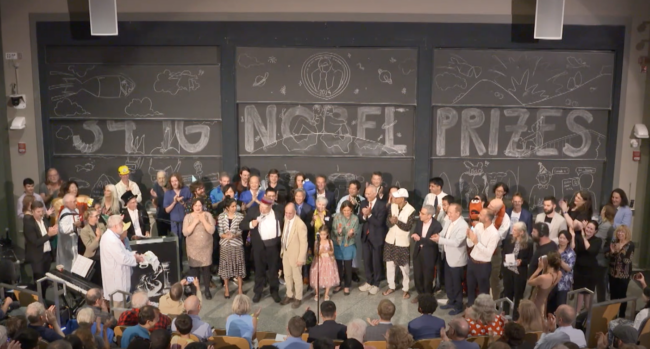
Every September since 1991 the IgNobel awards are given out, and so we now have the 2024 awards.
The what?
The IgNobel a satire of the Nobel prize which is shortly coming up. However, the published research that gets an IgNobel is real research. Basically they go find the weirdest whackiest research paper and then grant the researchers an award. Usually they turn up in person to receive the award.
Yes, it’s weird and wild whacky stuff, but it is also fun, and done with good humor.
They get real Nobel laureates to give out the prizes when they hold a prize giving ceremony each year at MIT.
OK, so my point is this – the list of the 10 weirdest bits of published Scientific Research is not simply my opinion, each of these ten have been officially recognised as such.
No more preamble, let’s just jump in now.
The top ten 2024 IgNobel Winners
Details mined via this link here.
Now remember, none of this is a spoof, all of it is real published research.
1. PEACE PRIZE [USA]
B.F. Skinner, for experiments to see the feasibility of housing live pigeons inside missiles to guide the flight paths of the missiles.
REFERENCE: “Pigeons in a Pelican”, B.F. Skinner, American Psychologist, vol 15, no. 1, 1960, pp. 28-37.
WHO CAME TO THE CEREMONY: B.F. Skinner’s daughter, Julie Skinner Vargas (in the hat below)
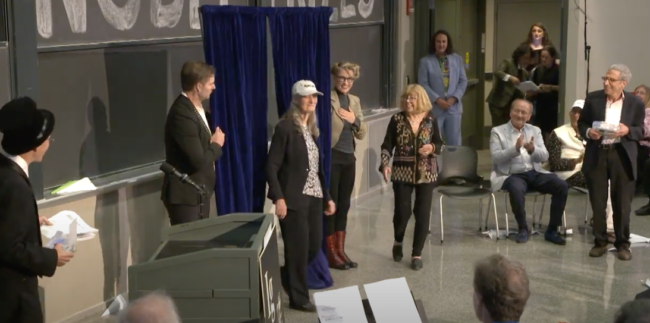
2. BOTANY PRIZE [GERMANY, BRAZIL, USA]
Jacob White and Felipe Yamashita, for finding evidence that some real plants imitate the shapes of neighboring artificial plastic plants.
REFERENCE: “Boquila trifoliolata Mimics Leaves of an Artificial Plastic Host Plant,” Jacob White and Felipe Yamashita, Plant Signaling and Behavior, vol. 17, no. 1, 2022.
WHO CAME TO THE CEREMONY: Felipe Yamashita (below)

3. ANATOMY PRIZE [FRANCE, CHILE]
Marjolaine Willems, Quentin Hennocq, Sara Tunon de Lara, Nicolas Kogane, Vincent Fleury, Romy Rayssiguier, Juan José Cortés Santander, Roberto Requena, Julien Stirnemann, and Roman Hossein Khonsari, for studying whether the hair on the heads of most people in the northern hemisphere swirls in the same direction (clockwise or counter-clockwise?) as hair on the heads of most people in the southern hemisphere.
REFERENCE: “Genetic Determinism and Hemispheric Influence in Hair Whorl Formation,” Marjolaine Willems, Quentin Hennocq, Sara Tunon de Lara, Nicolas Kogane, Vincent Fleury, Romy Rayssiguier, Juan José Cortés Santander, Roberto Requena, Julien Stirnemann, and Roman Hossein Khonsari, Journal of Stomatology, Oral and Maxillofacial Surgery, vol. 125, no. 2, April 2024, article 101664.
WHO CAME TO THE CEREMONY: Marjolaine Willems and Roman Khonsari (below being told by Miss Sweetie Poo, a little girl who repeatedly cries out, “Please stop: I’m bored”, in a high-pitched voice if speakers go on too long. That’s a well-established IgNobel tradition)
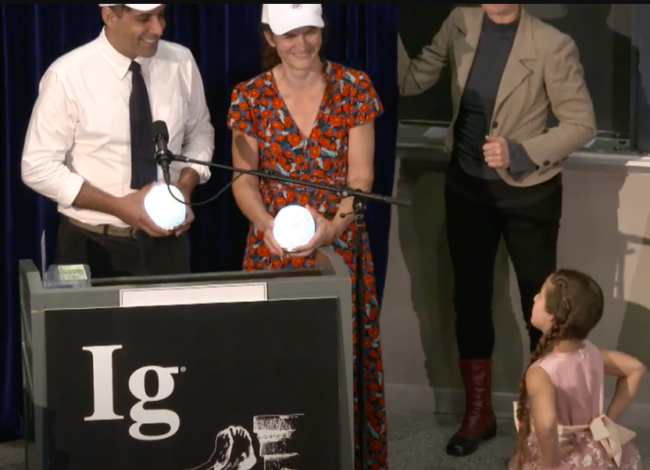
4. MEDICINE PRIZE [SWITZERLAND, GERMANY, BELGIUM]
Lieven A. Schenk, Tahmine Fadai, and Christian Büchel, for demonstrating that fake medicine that causes painful side-effects can be more effective than fake medicine that does not cause painful side-effects.
REFERENCE: “How Side Effects Can Improve Treatment Efficacy: A Randomized Trial,” Lieven A. Schenk, Tahmine Fadai, and Christian Büchel, Brain, vol. 147, no. 8, August 2024, pp. 2643–2651.
WHO CAME TO THE CEREMONY: Lieven Schenk (below accepting his prize)

5. PHYSICS PRIZE [USA]
James C. Liao, for demonstrating and explaining the swimming abilities of a dead trout.
REFERENCE: “Neuromuscular Control of Trout Swimming in a Vortex Street: Implications for Energy Economy During the Kármán Gait,” James C. Liao, The Journal of Experimental Biology, vol. 207, 2004, pp. 3495-3506.
REFERENCE: “Passive Propulsion in Vortex Wakes,” David N. Beal, Franz S. Hover, Michael S. Triantafyllou, James C. Liao, and George V. Lauder, Journal of Fluid Mechanics, vol. 549, 2006, pp. 385-402.
WHO CAME TO THE CEREMONY: James C. (“Jimmy”) Liao
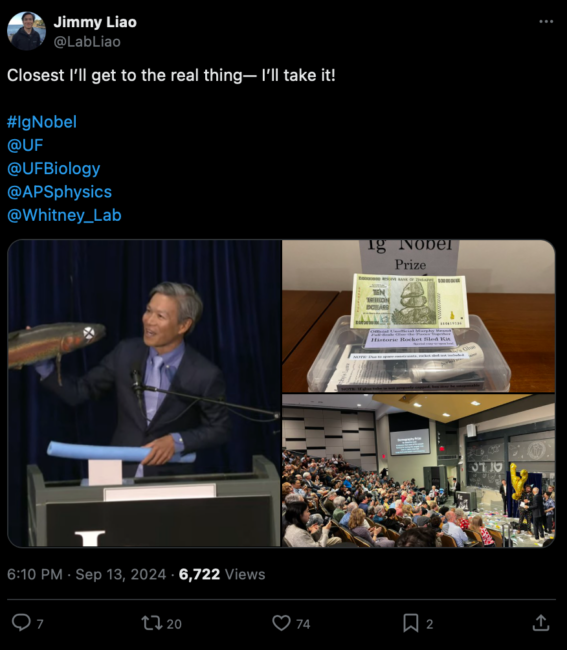
6. PHYSIOLOGY PRIZE [JAPAN, USA]
Ryo Okabe, Toyofumi F. Chen-Yoshikawa, Yosuke Yoneyama, Yuhei Yokoyama, Satona Tanaka, Akihiko Yoshizawa, Wendy L. Thompson, Gokul Kannan, Eiji Kobayashi, Hiroshi Date, and Takanori Takebe, for discovering that many mammals are capable of breathing through their anus.
REFERENCE: “Mammalian Enteral Ventilation Ameliorates Respiratory Failure,” Ryo Okabe, Toyofumi F. Chen-Yoshikawa, Yosuke Yoneyama, Yuhei Yokoyama, Satona Tanaka, Akihiko Yoshizawa, Wendy L. Thompson, Gokul Kannan, Eiji Kobayashi, Hiroshi Date, and Takanori Takebe, Med, vol. 2, June 11, 2021, pp. 1-11.
WHO CAME TO THE CEREMONY: Takanori Takebe, Toyofumi Chen-Yoshikawa, Ryo Okabe, Eiji Kobayashi, Yosuke Yoneyama, Yuhei Yokoyama
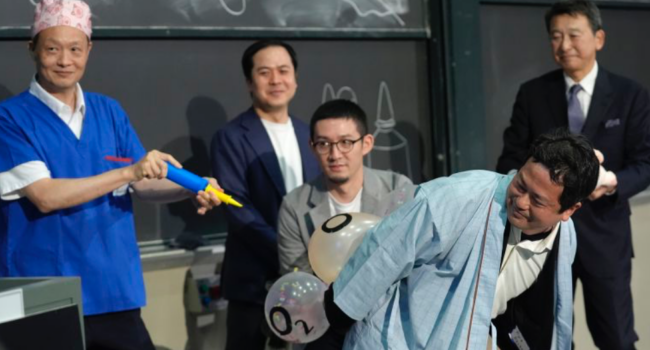
7. PROBABILITY PRIZE [THE NETHERLANDS, SWITZERLAND, BELGIUM, FRANCE, GERMANY, HUNGARY, CZECH REPUBLIC]
František Bartoš, Eric-Jan Wagenmakers, Alexandra Sarafoglou, Henrik Godmann, and many colleagues, for showing, both in theory and by 350,757 experiments, that when you flip a coin, it tends to land on the same side as it started.
REFERENCE: “Fair Coins Tend to Land on the Same Side They Started: Evidence from 350,757 Flips,” František Bartoš, et al., arXiv 2310.04153, 2023.
WHO CAME TO THE CEREMONY: Frantisek Bartos, and Eric-Jan Wagenmakers
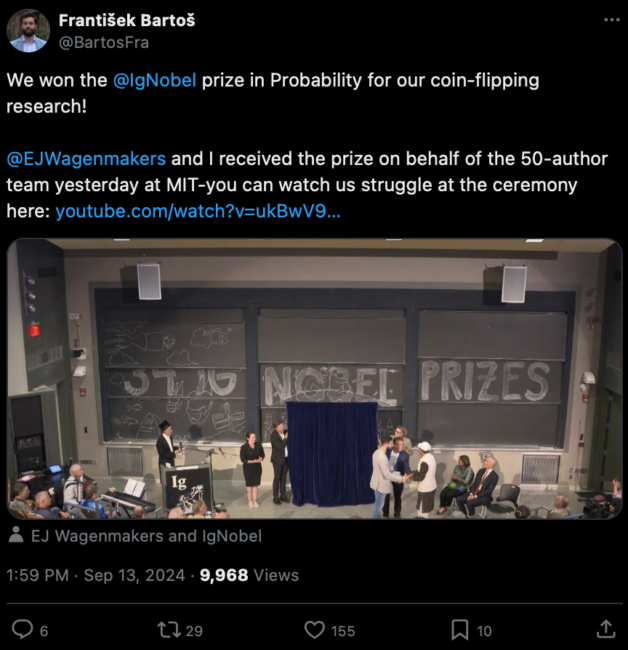
8. CHEMISTRY PRIZE [THE NETHERLANDS, FRANCE]
Tess Heeremans, Antoine Deblais, Daniel Bonn, and Sander Woutersen, for using chromatography to separate drunk and sober worms.
REFERENCE: “Chromatographic Separation of Active Polymer–Like Worm Mixtures by Contour Length and Activity,” Tess Heeremans, Antoine Deblais, Daniel Bonn, and Sander Woutersen, Science Advances, vol. 8, no. 23, 2022, article eabj7918.
WHO CAME TO THE CEREMONY: Tess Heeremans, Antoine Deblais, Daniel Bonn, Sander Woutersen (see below)
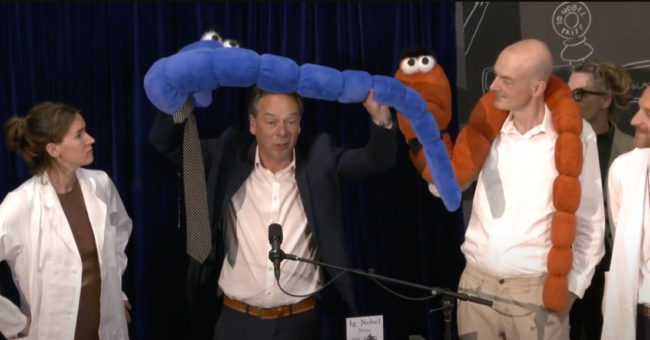
9. DEMOGRAPHY PRIZE [AUSTRALIA, UK]
Saul Justin Newman, for detective work to discover that many of the people famous for having the longest lives lived in places that had lousy birth-and-death record keeping.
REFERENCE: “Supercentenarians and the Oldest-Old Are Concentrated into Regions with No Birth Certificates and Short Lifespans,” Saul Justin Newman, BioRxiv, 704080, 2019.
REFERENCE: “Supercentenarian and Remarkable Age Records Exhibit Patterns Indicative of Clerical Errors and Pension Fraud,” Saul Justin Newman, BioRxiv, 2024.
WHO CAME TO THE CEREMONY: Saul Justin Newman (explains below that if you really want to practise what goes on in Blue Zones, then your best bet is to learn how to do pension fraud).

10. BIOLOGY PRIZE [USA]
Fordyce Ely and William E. Petersen, for exploding a paper bag next to a cat that’s standing on the back of a cow, to explore how and when cows spew their milk.
REFERENCE: “Factors Involved in the Ejection of Milk,” Fordyce Ely and W.E. Petersen, Journal of Dairy Science, vol. 3, 1941, pp. 211- 23.
WHO CAME TO THE CEREMONY: Fordyce Ely’s daughter Jane Ely Wells and grandson Matt Wells (below)
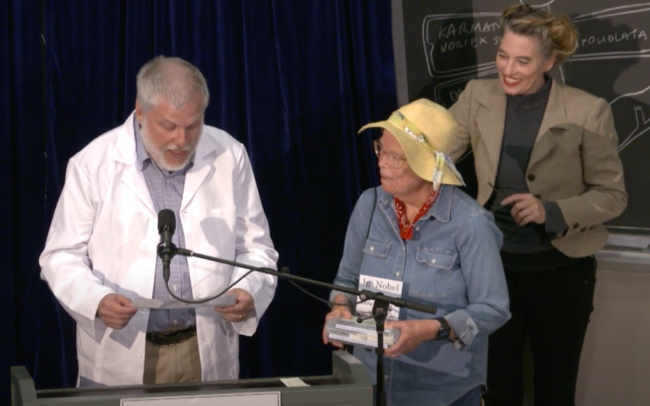
Do the Winners get a Prize?
Yea, they do, they really do.
If you win, it is worth real money. They collect $100 Trillion.
Seriously?
Yes really, but there is a catch. That’s $100 Trillion Zimbabwean dollars which is worth roughly 40 US cents.
But apart from that, as you can see from the pictures, those that show up to collect their award do have a real blast and also gain a bit of recognition.
Below is the full 90 minute 2024 award ceremony, and as you can see it really is very popular …
Lets Finish with a few Fun Quirky IgNobel insights
- Genuine Nobel Laureates physically hand out the prizes, and participate in the ceremony in other ways
- Andre Geim, who won an IgNobel Prize in 2000 for levitating a frog by magnetism, went on to win an actual Nobel Prize in physics ten years later in 2010 for his work with graphene.
- Nobel Prize-winning physicist Roy Glauber, known for his humbleness and sense of humor, would attend each and every year, and always helped sweep up afterward … literally. He sadly passed away at the age of 93
